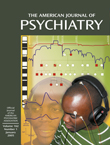Transcranial Magnetic Stimulation for Refractory Depression
To the Editor: Several studies have shown that repetitive transcranial magnetic stimulation is effective in the treatment of acute depressive symptoms (1). However, the maintenance effect of this technique has not yet been assessed. In this study, we sought to investigate the capability of repetitive transcranial magnetic stimulation, when administered regularly over a period of 3 months after an acute phase, in maintaining its efficacy with refractory treated depressed patients.
Eleven refractory depressed patients were included in this open study: six women and five men with a mean age of 47.18 years (SD=12.83) and a duration of illness of 9.03 years (SD=7.5). All participants gave their informed consent after receiving a detailed explanation of the study. Patients were recruited if they did not respond to at least two different antidepressants. Treatment parameters were as follows: stimulation over the left dorsolateral prefrontal cortex, 10 Hz, 80% of the motor threshold, 26 trains, 1600 pulses. They received one daily session over 2 weeks then three weekly sessions for 2 weeks. At the end of the first month, the patients received one weekly session over 1 month and then one session each fortnight.
The patients were assessed with the Hamilton Depression Rating Scale at baseline, after 1 month, and then after 4 months. Mean score on the Hamilton depression scale at baseline was 24.1 (SD=3.7).
Statistical analysis showed that mean Hamilton depression scale scores had decreased significantly by the end of the first month (mean=10.27, SD=3.87) (analysis of variance [ANOVA] for repeated measures followed by the Tukey-Kramer multiple comparison test, df=2, 30, p=0.003). At the end of the trial, the scores were maintained, and no statistical difference was found between the week 4 scores and the final scores (mean=10.36, SD=5.1) (ANOVA for repeated measures followed by the Tukey-Kramer multiple comparison test, df=2, 30, p=0.91). Moreover, eight patients were responders (with more than 50% reduction in Hamilton depression scale scores). Repetitive transcranial magnetic stimulation was well tolerated, and no side effects were noted.
All patients had improved after 4 weeks of treatment. This effect was maintained during the next 3 months. Even though our study was an open trial, the significance of these results are interesting regarding some difficulties found in the treatment of refractory depression.
The most robust findings were, first, the acute efficacy of repetitive transcranial magnetic stimulation with refractory depressed patients and, second, its maintenance effect over a period of 4 months. Nevertheless, only a few open studies are available concerning the maintenance effect of repetitive transcranial magnetic stimulation after the end of the cure (2 to 20 weeks) (2), and it deserves further double-blind studies.
1. Pascual-Leone A, Catala MD, Pascual-Leone Pascual A: Lateralized effect of rapid-rate transcranial magnetic stimulation of the prefrontal cortex on mood. Neurology 1996; 46:499–502Crossref, Medline, Google Scholar
2. Boutros NN, Gueorguieva R, Hoffman RE, Oren DA, Feingold A, Berman RM: Lack of a therapeutic effect of 2-week sub-threshold transcranial magnetic stimulation course for treatment-resistant depression. Psychiatry Res 2002; 113:245–254Crossref, Medline, Google Scholar



